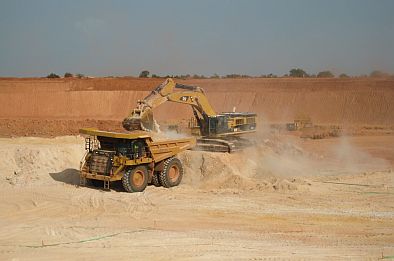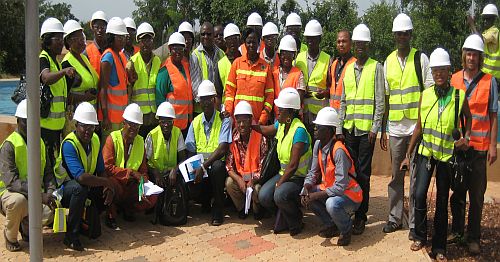The workshop aimed to enhance the understanding of journalists specializing in environment on the issues, impacts and hazards of mining on the environment. More than forty participants, journalists, parliamentarians, environmental experts and stakeholders in the mining sector, from 11 countries of West Africa and Central Africa, took part in five days of discussions, field visits and practices focusing on the relationship between mining and environmental protection.
Presentations and panel debates on mining and laws that surround it, have allowed journalists to understand that this is a complex activity that includes exploration, exploitation and trading. According to Mr. Bashirou Ouedraogo, Technical Advisor of the Burkina Minister of Mines, Quarries and Energy, speaking on behalf of the Minister at the opening ceremony of the workshop, "mines undoubtedly contribute to the socio-economic development of our countries. Unfortunately this does not happen without impacts on the environment and natural resources. "
 Although mining proves to be a source of jobs creation and a source of income for many West African countries, the nature and human balance is experiencing a profound disturbance in the mining areas. Natural ecosystems are difficult to be reconstituted and the quality of life can be altered after the end of the mining activities. Although there are national, regional and even international legislations that provide environmental protection in mining activities, the high cost related to compensation and the weak monitoring capacity of Governments and reactions from civil society organizations do not allow to truly tracing out the real effects of mining and the respect for environmental standards in West Africa.
Although mining proves to be a source of jobs creation and a source of income for many West African countries, the nature and human balance is experiencing a profound disturbance in the mining areas. Natural ecosystems are difficult to be reconstituted and the quality of life can be altered after the end of the mining activities. Although there are national, regional and even international legislations that provide environmental protection in mining activities, the high cost related to compensation and the weak monitoring capacity of Governments and reactions from civil society organizations do not allow to truly tracing out the real effects of mining and the respect for environmental standards in West Africa.
However, with the current boom in the mining sector, "compromises are possible between the economic and environmental issues in mining" says Mr. Abdoulaye Diarra, professor at the International Institute for Water and Environment (2iE) taking part in the panel debates during the workshop. According to the Chair of Global Water Partnership West Africa (GWP / WA), Mr. Hama Arba Diallo, also deputy mayor of Dori in the Sahel of Burkina Faso, "in the context of a country like Burkina, it is better to have gold than not having any" since this mining activity brings a lot of excitement in the light of the case of Essakane a gold mine located in the region of Dori. To get there, "the mobilization of all stakeholders is needed to mitigate environmental impacts and ensure the preservation of property and essential ecosystem services that support long-term development," said Dr. Aimé J. Nianogo, Regional Director of IUCN-PACO. That is why the Minister's representative, Mr. Ouedraogo Bashirou, welcomed and encouraged the initiative of the IUCN / PACO and GWP / WA targeting the media with their potential of awareness raising in addition to parliamentary for the capacity building workshop.
The five-day workshop was conducted in three phases: after two days of discussions with industry experts and a day of field visit, journalists made media productions on the impact of mining activities on natural and human systems including also on the period of post mining operations.
A disruption of human and natural balances related to mining
Located 90 km from Ouagadougou in the central Northern part of Burkina Faso, the rural town of Sabcé giving site to the Bissa Gold mine was visited by the workshop participants. The Bissa Gold company (90% owned by Russian interests NORGOLG and 10% by the State of Burkina Faso) is developing its gold mining activities on an area of 130 km2. Journalists met with local authorities, officials of the mining company and made a tour of the facilities of the mining site. The main observations made by journalists show that mining leads to a profound disruption of natural balance and affect deeply the production systems and the human organization. In Sabcé, the natural reserve within which the Company operates was the only reservoir of biodiversity in the area and today this heritage is endangered.
 Mining is affecting the forest reserve of the county directly covering 700 ha of fields of two villages that are Bissa and Yimiougou. Agriculture, the main activity of the inhabitants will suffer heavily from the effects of mining. Indeed, many farmers have been dispossessed of their crop field against financial compensation. Given the agricultural practices, this will create a void that only time will eventually fill. And the question of the management of this resource has already arisen in relation to the current floods in August 2012 that people attribute to the overflow of water from the dam built by the Bissa Gold Company.
Mining is affecting the forest reserve of the county directly covering 700 ha of fields of two villages that are Bissa and Yimiougou. Agriculture, the main activity of the inhabitants will suffer heavily from the effects of mining. Indeed, many farmers have been dispossessed of their crop field against financial compensation. Given the agricultural practices, this will create a void that only time will eventually fill. And the question of the management of this resource has already arisen in relation to the current floods in August 2012 that people attribute to the overflow of water from the dam built by the Bissa Gold Company.
Water is the most affected resource by mining activities since “without water, there is no mining" as support by the Deputy Director General of Bissa Gold, Dr. Christian Ouedraogo. To face that reality Bissa Gold has built a water reservoir with a capacity of over 100 million cubic meters. They will "only use about 4 million so there is a need to put up with the various stakeholders a mechanism to manage the rest of the resource of the dam," says Mr. Ouedraogo.
Another concern is the relocation of displaced households affected by the installation of mining activities. In the whole, compensations are especially based on material ownership while the cultural aspect remains forgotten. With mining activities in the natural reserve of Sabcé, it is evidence that the traditional knowledge and practices of protecting the environment and its resources have been disrupted. The natural reserve of Sabcé was felled of several traditional ritual sites and the head bodies of the mine company, in accordance with traditional authorities, have delimited them by putting terminals all around.
Moreover, the great influx of foreign populations to mining areas in search of employment and better living conditions created a concentration of people with its corollaries of wrongdoing as the moral depravity (prostitution, drugs, etc.). "Currently, it is not easy to get a house in Sabcé and even if it is found, the price is very high," said Mamadou Pierre Celestin ZOUNGRANA, mayor of the municipality.
Yet, each mining site has its specific realities, but the situation of the growing Sabcé gold mine remains characteristically to problems encountered in the mining areas of West Africa.
Often neglected, the period after-mine has attracted media
The management of after mine activities by mining companies was a key element raised during the workshop. All the communications have revealed that the issue is a big concern for governments, communities and mining companies. "We have started a process of implementing a wide program of reforestation on barren," said Mr. Frederic SOME, environmental manager at the Essakane gold mine, a company under control of the Canadian IAM Gold. The period following mine activities in the states of West Africa is currently rising as a difficult social and ecological debt to be cleared because the issue is not deeply assessed by populations and authorities. In Burkina Faso, for example, the closure of a mine at end of activities and the rehabilitation of the site are governed by the Code of mining investment. Thus, all the mining industries (as for both Bissa Gold and Essakane companies) are trying to implement a reforestation programme.
Actions of the GWP / WA and IUCN
The current regional meeting of media on mines and environment issues reflects the commitment of the GWP / WA and IUCN / PACO "to promote, in our states, a participatory development based on good information to all stakeholders, basis for sustainable development" said the Chair of GWP / WA, Arba Diallo. "GWP West Africa, since its establishment in 1999 in the region, is continuously fighting within States for an integrated management of natural resources starting with the water," added Arba Diallo. For part of IUCN, its role is to "inform, educate and advocate for a dialogue between stakeholders that facilitates sustainable practices and equitable sharing of benefits derived from the exploitation of resources," said Dr. Aimé J. Nianogo, Regional Director of West and Central Africa Programme. That is why the IUCN approach is to mobilize knowledge to reduce the environmental impacts of mining through training of stakeholders, dialogue building and developing initiatives for the most vulnerable groups, has underlined Jean-Marc Garreau, Regional program coordinator of IUCN-PACO, in his presentation on mining and biodiversity.
The Ouagadougou meeting was the sixth of series workshops that began in 2007 between GWP-WA and the media of the West African region. These annual meetings enable the establishment of a practice of sharing experiences among participants, experts and the organizers (GWP and IUCN). The end of each workshop is an opportunity of participants to renew their commitment to implement new knowledge to better address environmental issues. Since 2007, some positive actions are undertaking in this way among them the creation of special spaces dedicated to the processing of environmental information in some newspapers or radio by journalist attending to these meetings. One of these interesting practices remains the initiative of the designer of the website ENVIRONEWS NIGERIA (www.environewsnigeria.com). This site is specifically dedicated to environmental news and regularly updated by its promoter, reporter Michael SIMIRE, who usually took part to these meetings since 2007. For Mr. SIMIRE "The site is the culmination of my commitment at Bamako meeting", where was held the first workshop on December 27, 28 and 29, 2007.
For all the participants, the Ouagadougou workshop was a great opportunity for learning and building knowledge on environmental issues, giving the same way the opportunity to better inform audiences. 